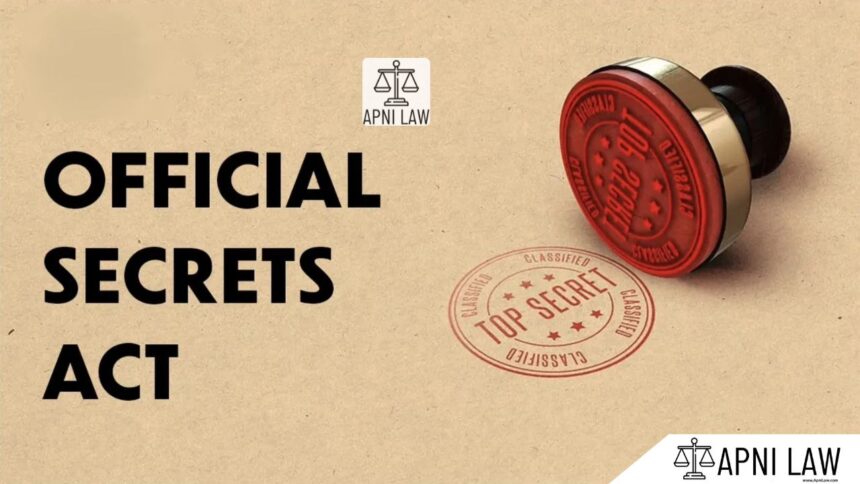Introduction
The Official Secrets Act, 1923 (India) sets a high standard for safeguarding national security by criminalizing the mishandling or disclosure of classified information, even without malicious intent. A feature of the Act is that it does not require the prosecution to prove that the accused intended to harm state interests. Instead, circumstantial evidence or the character of the accused can be sufficient for conviction. This makes the law exceptionally strict, covering both intentional and unintentional acts that result in the unauthorized handling or disclosure of official secrets.
The Act applies not only to Indian citizens but also to foreigners, particularly in cases involving espionage or communication with foreign agents. Penalties under the Act are severe and range from fines to imprisonment for up to 14 years. In cases involving acts of war or direct threats to national sovereignty, the punishment can extend to life imprisonment.
Who Can Be Punished Under the Official Secrets Act, 1923?
The Official Secrets Act applies to more than just government officials. It covers anyone whose actions threaten the safety or interests of the State.
General Public
Any person can face punishment for spying or sharing secret codes, passwords, maps, sketches, plans, or documents. If the information helps an enemy or harms India’s sovereignty, security, or foreign relations, it becomes a punishable act.
Trespassers at Prohibited Places
Anyone who enters, inspects, or hovers near a prohibited area without permission commits an offense.
Unauthorized Collection of Information
Those who collect, record, or publish information related to protected areas or secret matters without legal authority are liable under the Act.
Government Employees and Contractors
Officials, employees, or contractors who mishandle or leak classified information given to them through their role can be punished.
Journalists and Media Personnel
Media professionals who possess or share classified information fall under the Act. They must also cooperate during investigations. Failure to do so may lead to prosecution.
Companies and Organizations
When a company commits an offense, all involved in management, like directors, editors, publishers, or proprietors, can be held responsible.
How Does Prosecution Under The Official Secrets Act Work?
Prosecution under the Official Secrets Act is also triggered when classified material is mishandled outside designated or authorized areas. Obtaining, collecting, or recording any sensitive information, such as secret official codes, passwords, sketches, plans, models, articles, documents, or notes, without legal authority, particularly outside secure zones, constitutes a serious offense. Communicating or publishing such information to unauthorized persons, whether inside or outside prohibited areas, is equally punishable, regardless of the intent behind the disclosure.
Handling classified documents or information without official clearance, especially beyond secure premises, also leads to legal consequences. The law permits only authorized personnel to manage such secrets, and any unauthorized possession or control of them, especially in unapproved locations, invites prosecution. Similarly, trespassing or approaching restricted government areas with the intent to obtain or interact with sensitive data is treated as a violation of the Act.
Even the passive retention of official secrets, without any attempt to share or act on the information, can result in criminal charges. The Act emphasizes that unintentional acts, such as mistakenly possessing or miscommunicating official secrets, are not exempt from legal action.
What Is The Penalty Under Official Secrets Act?
Penalties under the Official Secrets Act are severe, ranging from imprisonment for up to 14 years to life imprisonment in cases involving acts of war against India. The Act’s stringent provisions underscore the importance of safeguarding national security and maintaining the confidentiality of sensitive information .
Case laws
- Nishant Agarwal – BrahMos Aerospace Engineer (Convicted in 2024).
Nishant Agarwal is a former engineer at BrahMos Aerospace in Nagpur, was convicted under the OSA for leaking sensitive technical information to Pakistan’s Inter-Services Intelligence (ISI). He was sentenced to life imprisonment by a Nagpur district court. Agarwal was arrested in 2018 during a joint operation by military intelligence and anti-terrorism squads from Uttar Pradesh and Maharashtra. He was also convicted under Section 66(f) of the IT Act. - Jyoti Malhotra – YouTuber (Arrested in May 2025).
Jyoti Malhotra is a travel vlogger from Hisar, Haryana, was arrested on charges of espionage under the OSA and Section 152 of the Bharatiya Nyaya Sanhita. She allegedly passed sensitive military information to Pakistani intelligence operatives. Investigations revealed her regular contact with an official from the Pakistan High Commission and financial transactions linked to espionage activities. - Jasbir Singh – YouTuber from Punjab (Arrested in June 2025).
Jasbir Singh, is a 41-year-old YouTuber from Mahlan village in Rupnagar, Punjab. He was arrested for allegedly participating in a Pakistan-backed espionage network. He reportedly passed sensitive information about Indian Army movements and classified data to Pakistan’s ISI. Singh had visited Pakistan thrice and had direct contact with ISI agents.
More Case Laws
- Shakur Khan – Rajasthan Government Employee (Arrested in May 2025).
Shakur Khan, was an assistant administrative officer in Jaisalmer’s employment department. He was arrested for allegedly spying for Pakistan. He was found to have unauthorized communication with Pakistan-based individuals, frequent travel to Pakistan without official clearance. Also, connections to ISI operatives. Khan was booked under the OSA and remanded to seven days of police custody. - Gagandeep Singh – Tarn Taran Resident (Arrested in June 2025).
Gagandeep Singh, also known as Gagan, was arrested by Punjab Police in Tarn Taran. He was accused for allegedly sharing sensitive Indian Army information with Pakistan during Operation Sindoor. He reportedly came into contact with Pakistan-based pro-Khalistan leader Gopal Singh Chawla via Facebook. He received payments for the information shared. Singh was charged under the OSA and the Bharatiya Nyaya Sanhita.









